If you want your content to be found via search engines, keyword research and selection should be a priority for you.
In fact, it must be one of your first essential steps when you’re about to write or update your content.
So in this post, I’ll talk about all you need to know about researching and picking the keywords you have the best chance of ranking for, step by step.
Why Find SEO Keywords?
For any type of content creation, you want to find what information your audience is looking for on topics related to your business.
In addition, you want to know what words and phrases they use to perform their search. This helps you in two ways:
Getting New Content Ideas – If you have no idea on what you should write next, keyword research helps you discover new topics to engage your audience.

Optimize Content For Search Engines – Even if you already have a blog post topic or content idea in mind, you need to know the words and phrases your audience searches to find information on that topic.
The idea is to choose 4-5 keywords (one primary keyword and remaining secondary keywords) which seem the most profitable for each piece of content.
And then optimize your new or current content for these keywords, which is a fancy way of saying that you’ll need to add these keywords to your content in a natural way.
Keyword Research: Discovery Phase
The first phase of keyword research involves generating as many relevant keyword ideas as possible. And I’d like to emphasize the word “relevant.”
Many people make the mistake of starting with really broad concepts like real estate, health, social media or hotels. So make sure to avoid that route.
Brainstorm Your Seed Keywords
Before you start with using any keyword research tools, you’ll need to brainstorm some keywords on your own, or with your team, first.
These keywords will act as a starting point to research more keywords. They are therefore known as seed keywords.
Macro-Level Seed Keywords: If you are trying to generate ideas for multiple pieces of content to write in the next few months, it’s good to have at least 4-5 seed keywords to begin with.
Asking the following questions might help:
- What would people search for to find your website homepage?
- What is your website about?
- What is your main value proposition?
- Who are your target audience?
Micro-Level Seed Keywords: If the purpose of your research is to pick keywords for a single piece of content, even just one or two seed keywords can do the trick.
For example, some time back I wrote an article on picking a niche for your blog. But before I wrote the piece, I conducted keyword research with the following as my seed keywords:
- pick a blog niche
- choosing niche for blogging
- define target market for blog
As you can see, you can think of your seed keyword ideas without using any tool if you apply a little creativity and resourcefulness.
It also helps to try to think of alternative words to the words that come to your mind. For example, “choose” is an alternative to “pick”, and “target market” is an alternative to “niche.”
Use Keyword Research Tools
Once you have a short list of seed keywords to get started, the following tools can help discover hundreds of new, relevant keywords.
I have only included the tools which are free or have affordable price points, which means you will not find big names like SEMRush or Ahrefs in this list.
There are differences in interface, features and the number of keywords returned by these tools. But on a basic level, they all work the same way.
Once you access any of these tools, you’re expected to enter your seed keyword. The tool will then return keywords related to the one you entered.
To get even more relevant keywords, you can repeat this process by entering another of your seed keywords.
Answer The Public (ATP) [Free]
ATP is great for discovering a huge number of keywords. In fact, ATP gives more keywords than some of the paid tools in this list. And the unique landing page doesn’t hurt either.

Since this tool is free to use, there are some features which are lacking. For example, you can’t see data on how many searches happen for the keywords per month, or how easy or difficult they are to rank for.
Moreover, when you enter a seed keyword, the results are generated in a circular format, which isn’t very helpful.
Luckily, there is an option to change the layout to present the keywords as a list. And even with missing features, ATP provides a lot more value than what can be expected from a free tool.
Google Keyword Planner [Free]
Google Keyword Planner used to be a good, free option. It was possible to get some decent keywords out of it, but that’s not the case anymore.
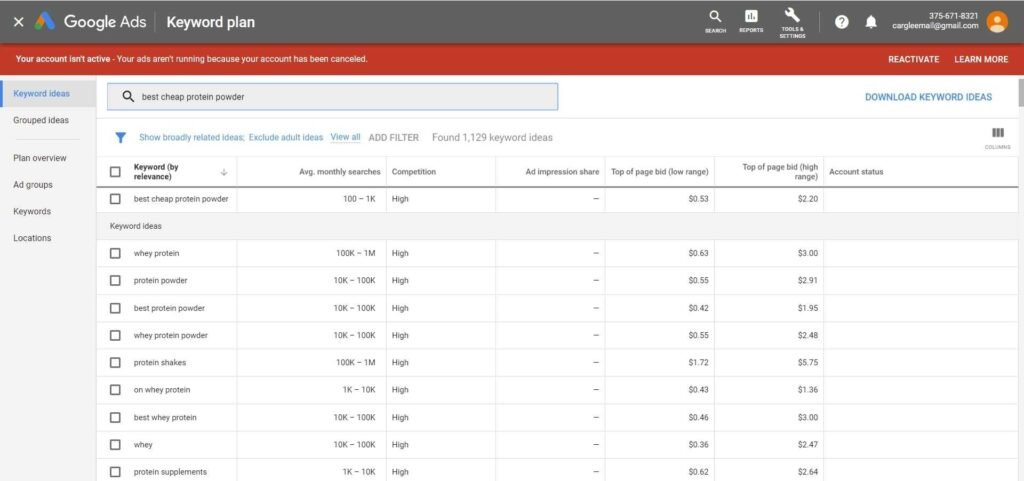
Moreover, the keywords don’t have a SEO difficulty score, which tells you if you have a chance of ranking in Google top 10 for that keyword.
The search volumes and competition metrics returned by this tool are also not very useful.
This is because a while ago, Google started combining tightly related long-tail keywords together and presenting them as one keyword.
In other words, it ends up hiding a lot of keywords from you. And the search volumes you see are not for each separate keyword, but a group of combined keywords.
This may make more sense for Google advertisers, but not when you’re conducting keyword research for organic SEO.
KeywordTool.IO [Freemium]
This tool lets you research keywords for not just Google, but a lot of other platforms. For instance, you can see data for YouTube, Twitter, Ebay and Instagram.

You get a lot of keyword ideas from the free version. The premium version allows you to see data associated with each keyword like search volume and ad competition.
Another tool where you can get keywords from different networks is Soovle.
UberSuggest [Free]
This is arguably the best free keyword research tool available at this time. It gives you a lot of keywords and data to analyze at no charge.
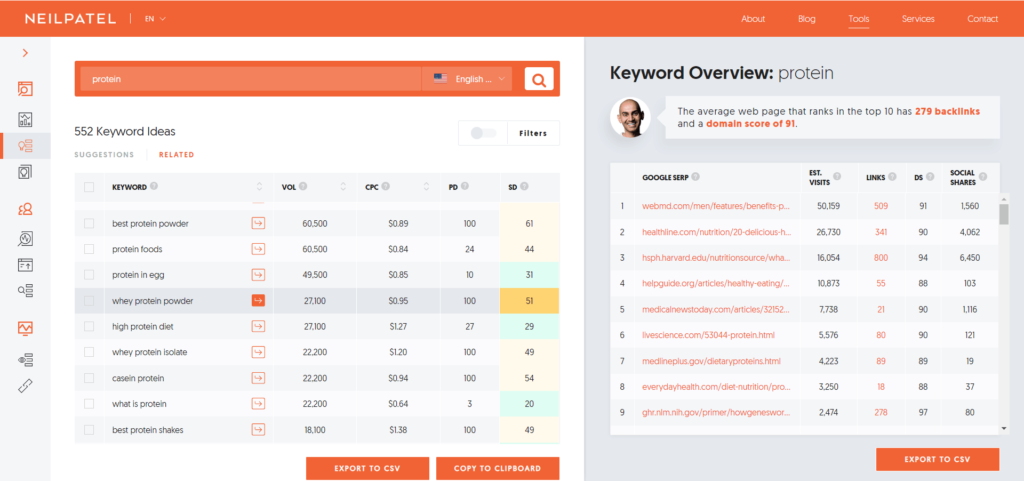
Another feature that is unique to UberSuggest is that you can see the keywords that your competitors are ranking for. And there’s also a backlink checker.
KWFinder [Premium]
While free tools have their value, we can’t argue with the fact that paid keyword research tools can do more to benefit your business.
That’s why I use KWFinder. Apart from a great interface and premium features, it’s also very affordable. This makes it my top recommendation.
When you enter your seed keyword in KWFinder, you don’t just get keywords, but also the SERP (search engine result page) explorer on the right.
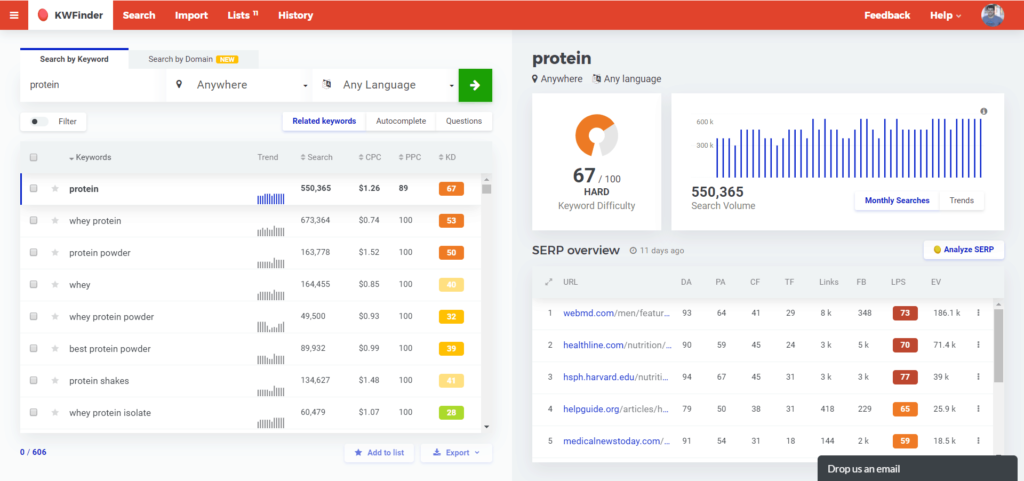
You can select any keyword from the keyword list on the left to see its SERP data on the right.
Moreover, you can also click on the Autocomplete or Questions tab to discover additional keywords.
Keyword Research: Selection Phase
Now you know how to generate hundreds of relevant keywords. But as we discussed, to get your content noticed via search engines, you need to choose the right keywords.
But what would you call the “right” keywords, exactly? How would you select the keywords to target for a piece of content?
From search volume to seo difficulty, let’s see how to select the most profitable keywords for SEO.
Consider Competition/SEO Difficulty
Before you decide to target a specific keyword, you need to have an idea of your competition and chances of ranking organically for that keyword.
You want to do this for all the keywords relevant to your content, and then pick the ones which are easier to rank for in the top 10 of search engine results.
There are two ways to get a sense of a keyword’s difficulty:
Moz Toolbar: It’s a free tool that shows you the domain authority (DA) and page authority (PA) for each of your competitors.
- DA refers to authority of the whole website
- PA refers to authority of the page you’re viewing
A high authority suggests that the website or page is more important in the eyes of Google and has a higher chance of ranking in top 10 results.
Once you have installed Mozbar, search Google for the keyword you are assessing. For each page in search engine results, you’ll now be able to see DA and PA.

The idea is not to look for a minimum or maximum number, but to get a sense of the range of DA and PA corresponding to high ranking pages.
If the top 10 pages have high DA and PA scores, you can estimate that it’s going to be hard to compete and rank for that keyword.
But if there are some results with low scores, that means your content is more likely to get into those results as well.
SEO Difficulty Score: The second way is to use a premium keyword research tool, because most such tools have a metric which indicates ranking difficulty of a keyword.
For example, here’s the difficulty score shown by KWFinder, when I search for or select the keyword “yoga for kids.”
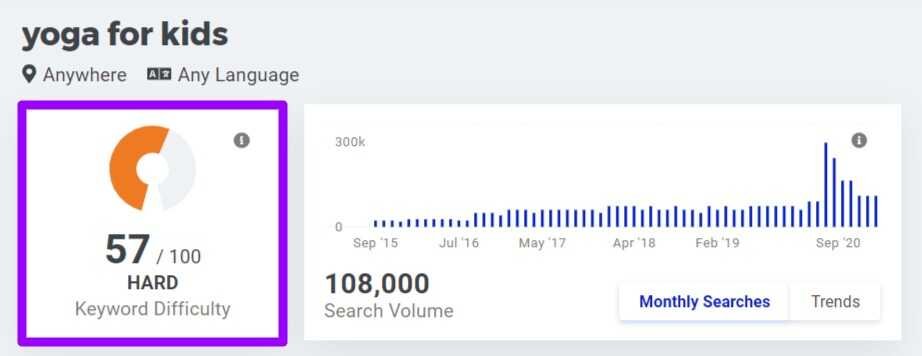
However, you’ll be wise to not rely only on the difficulty score shown by a tool. Those are not always accurate because they base the competition 100% on backlinks, and give less weightage to other ranking factors.
Consider Search Volumes
In addition to low seo difficulty, the next factor you want to look for is a high monthly search volumes.
The more people search for a keyword, the more traffic you can get if you’re ranking high for that keyword.
You can easily get this data from any of the premium keyword research tools. For example, here’s what KWFinder shows you when you put in a seed keyword.
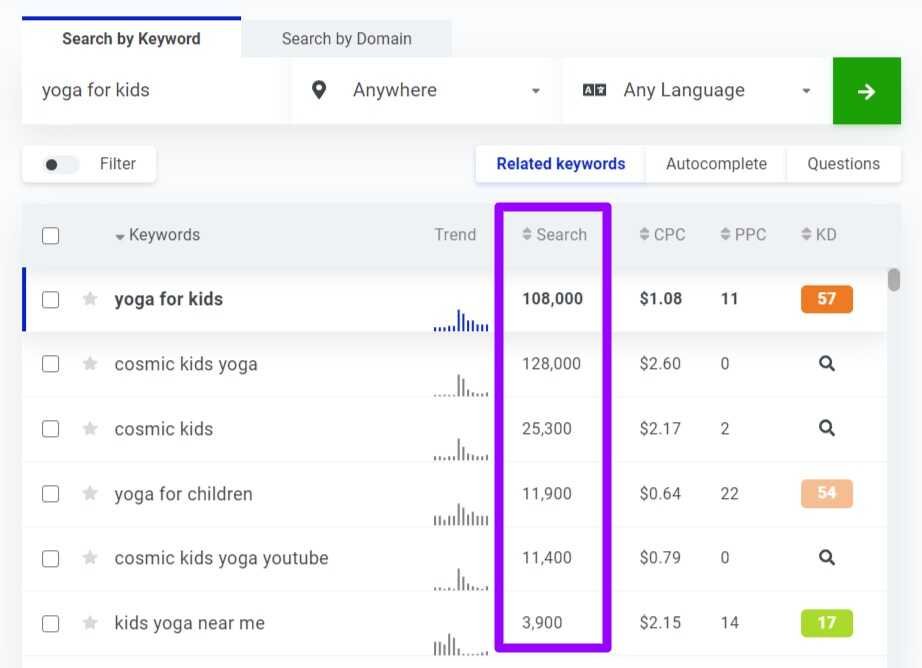
You can also click on the column name to sort the results by data in that column. Clicking on Search, for instance, will sort the keywords by their search volumes.
So when choosing keywords to target, I’d recommend striking a balance between low competition and high search volume.
Conclusion
Keywords are the foundation of an effective SEO strategy. Without researching and optimizing your content for the right keywords, search engines will find it hard to understand, index and rank your content.
Hopefully, this guide will help you pick the right keywords every time and start making a splash in search engine result pages.
Did I miss anything? Did you try these tips? Do you have any questions or comments? Share your thoughts below in the comments section.


